- Home
- David Gemmell
Ghost King Page 11
Ghost King Read online
Page 11
“Stupid wizard,” he said. “This is the wrong circle. I am days from the Caledones.”
Throughout the day Culain worked to assemble a circle of slender golden wire in the clearing below his cabin. He looped the wire around four birch trees, then marked the earth within the circle in a series of pentangles highlighted with chalk. At the center of the circle he constructed a perfect square, measuring the distances with great care from the angles of the square to the farthest points of the pentangles.
At noon he stopped, and Thuro brought him a goblet of wine, which he refused.
“This needs a clear head, Thuro.”
“What are you doing?”
“I am recreating the base layout of a minor circle—creating a gateway, if you like. But if I am more than a hairbreadth off in my calculations, we will end up in a world or a time we do not desire.”
“Where is Laitha?”
“She is watching the valley for sign of Eldared’s hunters.”
“Can I fetch you some food?”
“No. I must finish the circle and lay on the lines of magic. It will work only once; we will not be able to return here.”
“I will watch with Laitha.”
“No,” said Culain sharply, “you are necessary here. This whole circle is geared to you and your harmony. It is our only hope of finding the sword.”
Toward dusk Laitha came running into the clearing.
“There is a single rider moving up the valley,” she said. “Shall I kill him?”
Culain looked bone-weary. “No. No needless slaying. I am almost ready. Thuro, go with Laitha and see the man. Gian, stay hidden, and if the rider has hostile intent, shoot him down.”
“I thought you needed me,” said Thuro.
“The work is nearly done, the destination set. We will leave at dawn.”
“Would it not be safer to leave now?” asked Laitha.
“The sun is almost gone, and we need its energies. No, we must survive one more night in the mountains.”
Thuro and Laitha set off to intercept the rider, moving swiftly down the forest trails. As Thuro ran behind the lithe girl, he found his mind straying from concern about the horseman to appreciation of the supple, liquid grace of Laitha’s movements.
Thuro spotted the rider moving carefully up the mountain trail and squatted down with Laitha behind a thick bush. The man rode a tall black stallion of almost seventeen hands and was dressed in a cream woolen tunic edged with braid and black trews decorated with small silver disks; he carried a dark bow of horn. He was in his early twenties, with fair hair and a straggly blond beard.
Thuro stepped out onto the path as Laitha notched an arrow to her bow.
“Welcome, stranger,” said Thuro.
The man reined in. “Prince Thuro?”
“Yes.”
“I have been sent to find you.”
“Then step down from your mount and draw your sword.”
Laitha had no intention of allowing Thuro to fight and loosed her shaft. At that moment an owl fluttered from a nearby branch, and the stallion shied. Laitha’s arrow took the horse in the throat, and it fell, throwing the rider into the bushes beside the trail. Thuro was furious. He ran forward and helped the man to his feet, noticing for the first time that the rider was a cripple. Laitha stood with a second arrow notched.
“Damn you!” Thuro yelled. “Get out of my sight!” He moved to the horse, which was writhing on the ground, and opened its jugular with his hunting knife. “I am sorry,” he told the man. “It was none of my doing.”
“It was a fine horse—best I ever owned. I hope you have others.”
“No.”
The man sighed. “The gods give, the gods take away.”
“Where is your sword?” Thuro asked.
“For what should I need a sword?”
“To fight me, of course. Or were you intending to use your bow?”
“Maedhlyn sent me to fetch you home. My name is Prasamaccus; I have been staying with Victorinus.”
“Thuro!” called Laitha. “Look!”
Farther down the trail some dozen riders were following the tracks left by Prasamaccus.
“Your friends have arrived,” said the prince.
“No friends of mine. What I told you was true.”
“Then you had better follow me,” said Thuro. “Here, let me carry your bow.”
Prasamaccus handed him the weapon, and the trio set off, keeping away from the path. The sun was sinking, and the three faded from sight in the gathering gloom. They moved on for more than a quarter of an hour, forced to walk slowly to allow the limping Prasamaccus to keep up.
They reached the cabin as the moon cleared the clouds, and Culain ran forward to meet them.
“Who is he?”
“He says Maedhlyn sent him,” answered Thuro, “but Eldared’s hunters are only minutes behind us.” Culain cursed.
A gasp came from Laitha, and the three men swung toward her. She was holding up her arm and staring at the bracelet on her wrist; it had begun to glow faintly.
“The Soul Stealers,” whispered Thuro.
“Would it be possible to have my bow back?” asked Prasamaccus.
Culain drew a silver knife and held it gently to the Brigante’s throat; then he took the Sipstrassi Stone from his pocket and touched it to the man’s temple. “Tell me why Maedhlyn sent you.”
“He said to bring the prince to the circle of stones near Pinnata Castra. Then he would spirit us both home.”
The knife returned to Culain’s sheath. “Give him his bow and let me have the arrows.” The Mist Warrior touched his stone to each of the twenty arrowheads and handed the quiver to Prasamaccus.
He notched an arrow to the string. The head shone with a white-blue light. “Very pretty,” he said. A dark shadow sped from the trees, and before Laitha could react, Prasamaccus had drawn and loosed. The shaft took the assassin in the chest; the dark cloak billowed and fell to the ground, the Brigante’s arrow beside it.
“Into the circle!” Culain yelled. More dark shapes moved into sight. Prasamaccus and Laitha both loosed shafts, while Culain ran forward, sweeping up his lance from the ground beside the golden wire. “Move to the central square,” said Culain. As Thuro, Laitha, and Prasamaccus clambered over the wire, the Mist Warrior swung in time to block the thrust of a gray blade, cutting the lance head through the assassin’s neck. More of the shadows converged toward the circle. Culain leapt the wire, but a cold knife cut into his shoulder. As his limbs lost their power, he shouted one word. A golden light filled the circle, forcing the shadow killers back. Bright as noonday, the glare was blinding. When it faded, the circle was empty, the golden wire gone, the earth smoldering.
Culain awoke in a broken circle of stones on the side of a high hill overlooking a deserted Roman fortress. He sat up and breathed deeply until the unearthly drowsiness left his limbs. The fortress below had partially collapsed, and several huts nearby had been constructed partly of stone from the ruined building. Culain glanced at the sky; a single moon hung there. The sky was clear, and he examined the stars. He was still in Britain. He cursed loudly.
A glow began to his left, and he swept up his lance and waited. Maedhlyn appeared.
“Oh, it’s you,” said the Enchanter. “Where is the boy?”
“Gone seeking his father’s sword.”
“Alone?”
“No; he has a girl and a cripple with him.”
“Wonderful,” said Maedhlyn.
Culain pushed himself to his feet. “It is better than him being dead.”
“Marginally,” Maedhlyn agreed. “What happened?”
“Soul Stealers came upon us. I sent Thuro and the others through a gateway.”
“Which one?”
“I made it.”
“Made? Oh, Culain, that was foolhardy indeed.”
“Worse than you know. I had to send them at night.”
“Better and better.” Maedhlyn sniffed loudly and cleared
his throat. “You look older,” he said. “Do you need a stone?”
“I have one, and I look older because I choose to. It is time to die, Maedhlyn. I have lived too long.”
“Die?” Maedhlyn whispered, his eyes widening. “What nonsense is this? We are immortal.”
“Only because we choose to be. I choose not to be.”
“What does Athena say about this?”
“Her name is Goroien. We left that Greek nonsense behind centuries ago, and I have not seen her in forty years.”
“It is cold here. Let us return to my palace; we’ll talk there.”
Culain followed him within the glow, and the two walked down the long hill to Eboracum and the converted villa Maedhlyn owned near the southern wall. Inside a fire burned brightly in an ornate stone hearth. The Enchanter had always heartily disliked Roman central heating, claiming it made his head thick and disturbed his concentration.
“You used not to think it nonsense,” said the Enchanter as they sat together drinking mulled wine by the fire. “You made a wonderful Ares, a fine god of war. And we did help the Greeks after a fashion; we gave them philosophy and algebra.”
“You always were a capricious meddler, Maedhlyn. How do you maintain your appetite for it?”
“People are wonderful creatures,” said the Enchanter. “So inventive. I never tire of them and their gloriously petty wars.”
“Have I mentioned before that I dislike you intensely?”
“Once or twice, Culain, now I come to recall—though I cannot understand why. You know I would have given my life to save Alaida.”
“Do not speak of her!”
Maedhlyn settled back in his deep leather chair. “Getting old does not suit you,” he said.
Culain chuckled, but there was little humor in the sound. “Getting old? I am old—as old as time. We should have died with the waves that destroyed Balacris.”
“But we did not, thank the Source! Why did you leave Goroien?”
“She could not understand my decision to become mortal.”
“That’s understandable. If you remember, she fell in love with the hero Gilgamesh and watched him age; some problem with his blood that the stone could not overcome. But I can see how she would not want to watch such an event again.”
“I liked him,” said Culain.
“Even though he took Goroien from you? You are a strange man.”
“It was a passing fancy, and it is truly ancient history. What are your plans now, my Lord Enhancer, now that someone else is playing your game?”
“Enchanter, if you please. And I am unconcerned. Whoever it is can never play as well as I. You should know that, Culain; you have witnessed my genius through the ages. Did I not inspire the building of Troy? Did I not take Alexander to the brink of domination? To name but two small achievements. You think Eldared’s petty sorcerer can oppose me?”
“As always, your arrogance is a joy to behold. You seem to forget how it has humbled you in the past. Troy fell despite your attempts to save it. Alexander took a fever and died. And as for Caligula … what on earth did you see in that boy?”
“He was bright as a button—much maligned. But I take your point. So who do you think is behind Eldared?”
“I have no idea. Pendarric has the power, but he tired of mortals long ago. Brigamartis, perhaps.”
“She took to playing the gods’ game with the Norse, but she’s gone now. I haven’t heard of her in a century or more. What of Goroien?”
“She would never use the Soul Stealers.”
“I think you forget how ruthless she could be.”
“Not at all. But not for someone else—not a petty king like Eldared. He couldn’t pay enough. However, that is your problem now, Enchanter. I want nothing more to do with it.”
“You surprise me. If Eldared has the power to summon the Soul Stealers and open a gate on your mountain, then he has the power to send assassins after the boy wherever he is. I take it you left nothing belonging to the prince on the mountain.”
Culain closed his eyes. “I left his old clothes in a chest.”
“Then they can find him. Unless you stop them.”
“What are you suggesting?”
“Find the power behind Eldared and slay it. Or slay the king.”
“And what will you be doing while I am scouring the countryside?”
“I will use this,” said the Enchanter, lifting a yellowed leather-covered wedge of parchment. “It is the most valuable possession Thuro had. The works of Plutarch. Much of his harmony remains in it. I shall follow him through the Mist.”
* * *
Prasamaccus gazed around himself. The landscape had changed; it was more rugged and open, the mountains stretching out into the distance beyond an immediate wooded valley. And it was bright … he looked up, and his heart sank. Two moons hung in the sky, one huge and silver-purple, the other small and white. The Brigante feared he knew what such phenomena might mean, and it was not good news. There was no sign of the warrior with the storm-cloud eyes.
“Where is Culain?” screamed Laitha.
“He did not manage to reach the central square,” Thuro said softly. His eyes met those of Prasamaccus, who understood the unspoken thought. Culain had fallen among the Soul Stealers; both had seen it. Laitha began to search beyond the circle of white stones, calling Culain’s name. Thuro sat down alongside Prasamaccus.
“I did not think anything could kill him,” said Thuro. “He was an amazing man.”
“I regret not having known him,” said Prasamaccus with as much sincerity as he could muster. “Tell me, how do we get home?”
“I have no idea.”
“Strange, I thought you were going to say that. Do you know where we are?”
“I am afraid not.”
“I should have been a fortune-teller. I am beginning to know the answers to these questions before you speak. One last question. Does that second moon mean what I think it means?”
“I am afraid so.”
Prasamaccus sighed and opened his pouch, producing a small seed cake. Thuro smiled; he was beginning to like the crippled archer.
“How did you meet Victorinus?”
Prasamaccus swallowed the last of the seed cake. “I was out hunting …” He told Thuro of seeing the Atrols and fleeing to a stone circle and of the journey with Maedhlyn back to Eboracum. He did not mention Helga; the thought of never seeing her again was too painful. Meanwhile Laitha wandered back into the circle and sat down, saying nothing. Prasamaccus offered her his last seed cake, but she refused.
“It’s your fault, cripple,” she snapped. “If we had not had to wait for you, we could have escaped with Culain.”
Prasamaccus merely nodded. It did not pay to argue with women.
“Nonsense!” stormed Thuro. “If you had not killed the poor man’s horse, we would have arrived the sooner.”
“You are saying it is my fault he is dead?”
“You are the one who introduced the question of fault, not I. Now, if you cannot be civil, hold your tongue!”
“How dare you? You are not my kinsman or my prince. I owe you nothing.”
“If I might—” began Prasamaccus.
“Be quiet!” Thuro snarled. “I may not be your prince, but you are my responsibility. It is what Culain would have wanted.”
“How would you know what he wanted? You are a boy; he was a man.” She stood and stalked off into the darkness.
“Arguing with women offers no reward,” said Prasamaccus softly. “They are always right; I saw that in my village. You’ll only have to apologize to her.”
“For what?”
“For pointing out that she was wrong. What are your plans, Prince?”
Thuro sat back. “Are you not angry with her for accusing you?”
“Why should I be? She was right; I slowed you down.”
“But—”
“I know, she killed my horse. But how far can we take this back? Had I not been riding
into the mountains, you would not have been delayed at all. Had you not been missing, I would not have been riding. Is it your fault? Arguing about it will not light us a fire, or find food.”
“You are very philosophical.”
“Of course,” agreed Prasamaccus, wondering what it meant. He stood and limped out beyond the circle, seeking twigs for a fire, but there were none. “I think we should camp in those woods until morning,” he said.
“I’ll fetch Laitha.”
“I’ll do it,” said Prasamaccus swiftly, limping out to where she sat.
The trio found a sheltered hollow and lit a campfire against a fallen trunk. Without blankets or food they sat silently, each lost in thought. Laitha grappled with grief and ill-understood anger. Thuro wondered what plan Culain might have conceived following their arrival. Would he have known this land? And if he had not, what would he have done? Set off north? South? Prasamaccus lay down beside the fire and thought of Helga. Five weeks of bliss. He hoped she would not have to wait for him too long.
When Thuro awoke, Prasamaccus had already started a fire and four clay spheres were sitting in the flames. The prince stretched his cramped muscles. Laitha still slept.
“You are up early,” said Thuro, glancing at the dawn sky.
“Best to catch pigeons while they sleep. Are you hungry?”
“Ravenous.” Prasamaccus hooked a ball from the fire with a short stick, then cracked a rock to it. The clay split cleanly, taking all the feathers from the bird. The meat was dark and similar to beef, and Thuro devoured it swiftly, sucking clean the fragile bones.
“I found a high hill,” said Prasamaccus, “and from there I studied the land. I could see no sign of building, but there is some evidence of tilled fields to the west.”
He rolled another ball from the fire and split it; then he moved to where Laitha lay and gently pushed her shoulder. She awoke, and he smiled at her. “There is breakfast cooking. Come eat.” She did so in silence, careful to avoid even looking at Thuro.
“Why did Storm-eyes send you here?” asked the Brigante.

 Bloodstone
Bloodstone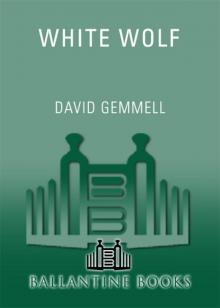 White Wolf
White Wolf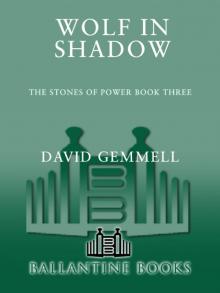 Wolf in Shadow
Wolf in Shadow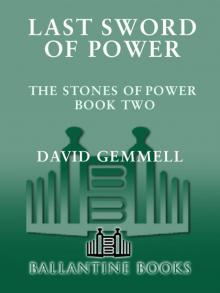 Last Sword of Power
Last Sword of Power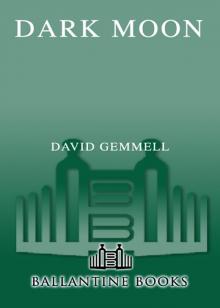 Dark Moon
Dark Moon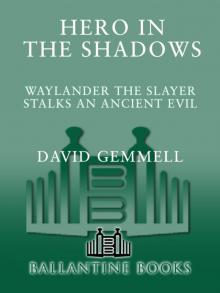 Hero in the Shadows
Hero in the Shadows Gemmell, David - Drenai 09 - Hero In The Shadows
Gemmell, David - Drenai 09 - Hero In The Shadows Waylander
Waylander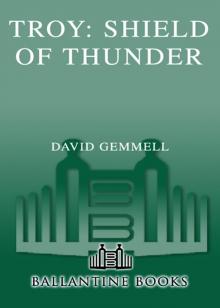 Shield of Thunder
Shield of Thunder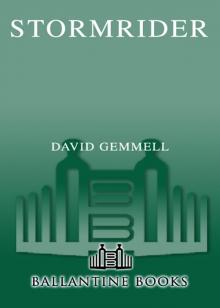 Stormrider Stormrider
Stormrider Stormrider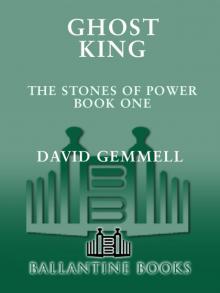 Ghost King
Ghost King Legend
Legend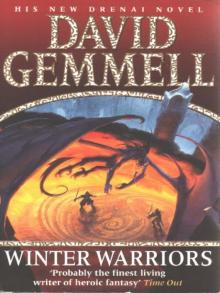 Winter Warriors
Winter Warriors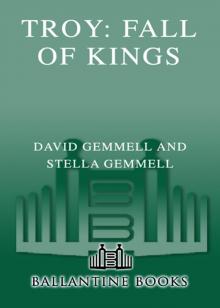 Fall of Kings
Fall of Kings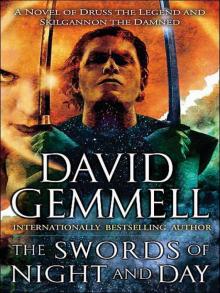 The Swords of Night and Day
The Swords of Night and Day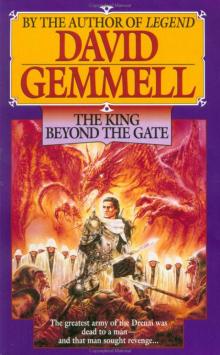 The King Beyond the Gate
The King Beyond the Gate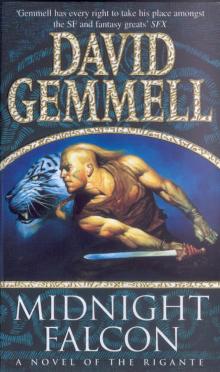 Midnight Falcon
Midnight Falcon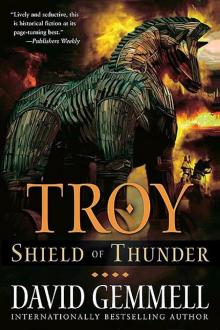 02 - Shield of Thunder
02 - Shield of Thunder In the Realm of the Wolf
In the Realm of the Wolf Ravenheart
Ravenheart The First Chronicles of Druss the Legend
The First Chronicles of Druss the Legend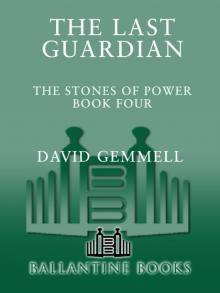 Last Guardian
Last Guardian Stormrider
Stormrider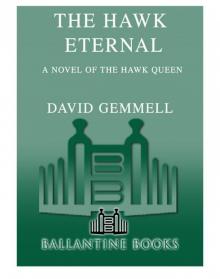 The Hawk Eternal
The Hawk Eternal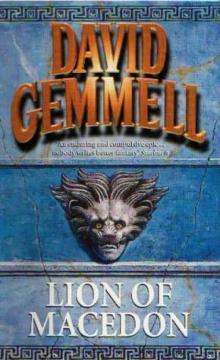 Lion of Macedon
Lion of Macedon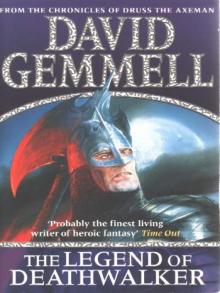 The Legend of Deathwalker
The Legend of Deathwalker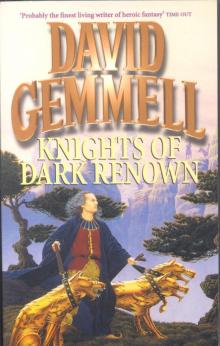 Knights of Dark Renown
Knights of Dark Renown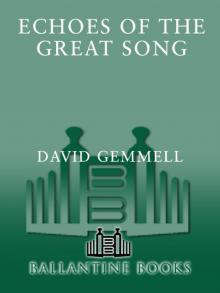 Echoes of the Great Song
Echoes of the Great Song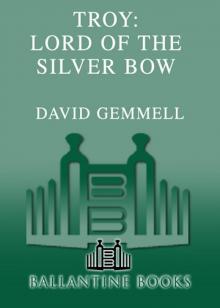 Lord of the Silver Bow
Lord of the Silver Bow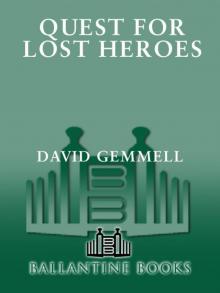 Quest for Lost Heroes
Quest for Lost Heroes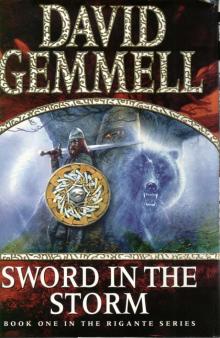 Sword in the Storm
Sword in the Storm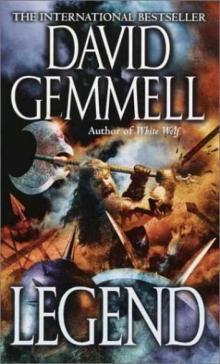 Drenai Saga 01 - Legend
Drenai Saga 01 - Legend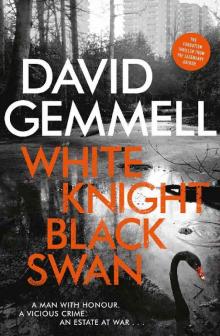 White Knight/Black Swan
White Knight/Black Swan![[Troy 02] - Shield of Thunder Read online](http://i1.bookreadfree.com/i/03/19/troy_02_-_shield_of_thunder_preview.jpg) [Troy 02] - Shield of Thunder
[Troy 02] - Shield of Thunder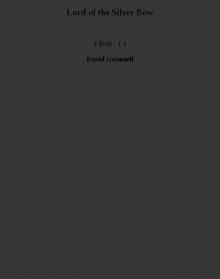 Lord of the Silver Bow t-1
Lord of the Silver Bow t-1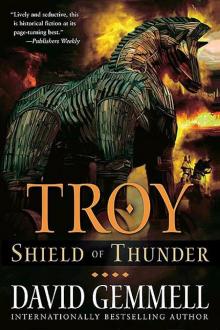 Shield of Thunder t-2
Shield of Thunder t-2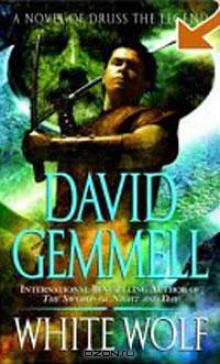 White Wolf: A Novel of Druss the Legend dt-10
White Wolf: A Novel of Druss the Legend dt-10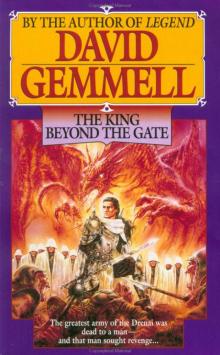 Drenai Saga 02 - The King Beyond the Gate
Drenai Saga 02 - The King Beyond the Gate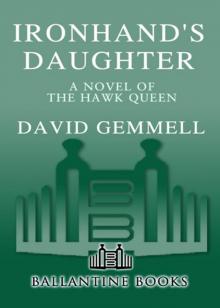 Ironhand's Daughter
Ironhand's Daughter Gemmell, David - Drenai 06 - The First Chronicles of Druss the Legend
Gemmell, David - Drenai 06 - The First Chronicles of Druss the Legend The Last Guardian
The Last Guardian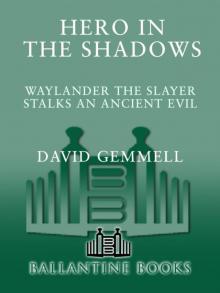 Hero in the Shadows: A Waylander the Slayer Novel
Hero in the Shadows: A Waylander the Slayer Novel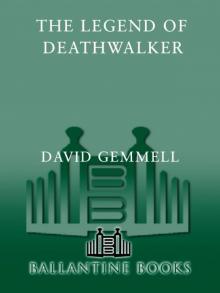 The Legend of the Deathwalker
The Legend of the Deathwalker